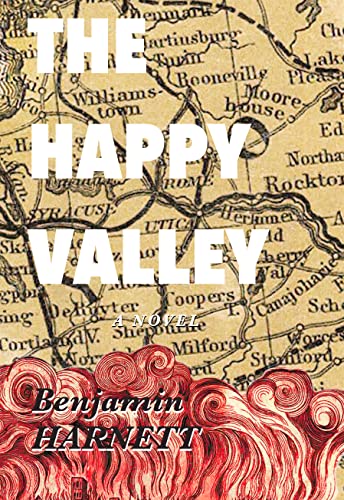
The Happy Valley by Benjamin Harnett is an innovative and genre-bending work that reveals startling truths about an idyllic rural community in upstate New York.
Separated into two parts – “The Farm” and “The Key” – an unnamed narrator embarks on a journey to find June, his ex-lover who has disappeared. Moving back and forth between the historical and more recent pasts (the 1800s, the 1990s) and a futuristic present (2036 and beyond), the novel is part historical novel, part science/speculative fiction, and part self-reflexive meta-fiction.
In “The Farm,” our narrator recalls junior high, where he first met and fell for the enigmatic June, whose family had just moved to the farm from Ohio. He and his friends invite June to join a role-playing game they invented; she accepts the boys’ gesture of friendship but unbeknownst to them, June has an agenda, one that includes Clyde Duane, the ominous school janitor who possesses a mysterious golden key.
The second part, “The Key,” continues with the investigation into June’s disappearance but introduces other key mysteries. One such secret revolves around the narrator’s new lawyer friend, Tiffany, and her employer, Mr. Jeremiah: he has specifically recruited Tiffany to his firm and his past is oddly connected to the missing June. Other mysteries involve the narrator’s childhood friends, now adults still living in Harmony Valley – the aged and seemingly sinister Clyde Duane and his golden key, and June’s mother, Ann, and it turns out that Tiffany knows a lot more about the disappearance than our narrator could have known – an enticing number of storylines that keeps the reader guessing.
The opening of the novel suggests it be read as a Gothic tale and it does contain supernatural elements, old houses with mysterious passageways, and a curse, moving into the historical and science fiction, an impressive genre mashup that Harnett achieves to mostly good effect. However, the novel’s ambition may exceed its grasp at times, as the story adds new layers of information incrementally with the narrator struggling to absorb and assimilate it all, and the reader is faced with the same experience. This is precisely the point, as we viscerally feel the protagonist’s dilemma, but it can also be frustrating, especially as the narrator is unreliable. Sometimes he is unable to recall details from his own experiences, or he will present new information without context, and these moments seem more convoluted than directed.
Similarly, as the narrator’s journey returns to the past, there are unexpected and well-executed plot surprises, many of which are grounded in larger issues we face in the world today – race and gender and sexual politics, war and revolt, progress and technology, and climate change – but sometimes the attention to these subjects is more of a distraction from the plot than an enriching addition, important as these issues may be. The novel is engrossingly complex, but sometimes thematically confusing, as these myriad threads sometimes get in the way of clarity of purpose.
That said, The Happy Valley is uniquely inventive, and must be lauded for its scope. With an ambitious number of genres at play, a host of captivating characters, and an innovative plot, The Happy Valley is a well-written, imaginative work that will quickly draw readers into the mysterious narrator’s search for truth.
Book Links
STAR RATING
Design
Content
Editing
Get an Editorial Review | Get Amazon Sales & Reviews | Get Edited | Get Beta Readers | Enter the SPR Book Awards | Other Marketing Services























Leave A Comment